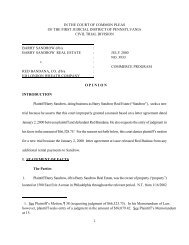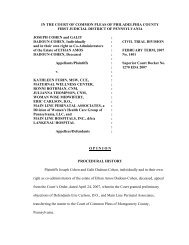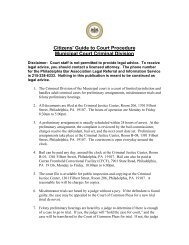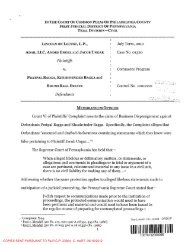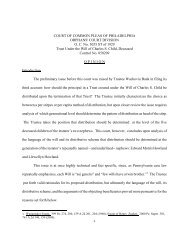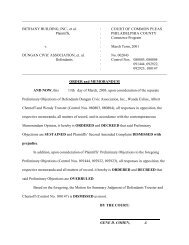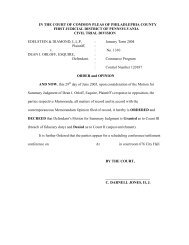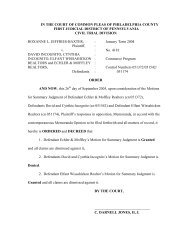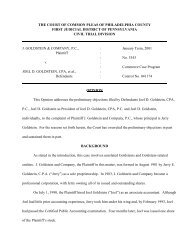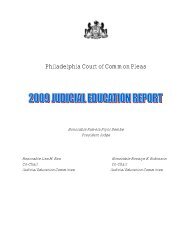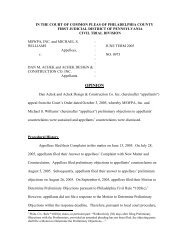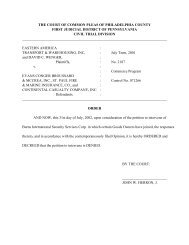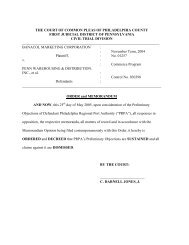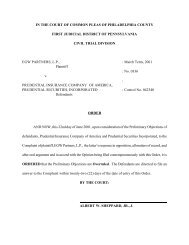WILLIAM BOYD vs JOHNSON & JOHNSON, et al. - The Philadelphia ...
WILLIAM BOYD vs JOHNSON & JOHNSON, et al. - The Philadelphia ...
WILLIAM BOYD vs JOHNSON & JOHNSON, et al. - The Philadelphia ...
You also want an ePaper? Increase the reach of your titles
YUMPU automatically turns print PDFs into web optimized ePapers that Google loves.
THE COURT OF COMMON PLEAS OF PHILADELPHIA COUNTY<br />
FIRST JUDICIAL DISTRICT OF PENNSYLVANIA<br />
CIVIL TRIAL DIVISION<br />
<strong>WILLIAM</strong> <strong>BOYD</strong>, : January Term, 2001<br />
Plaintiff :<br />
: No. 965<br />
v. :<br />
: Commerce Case Program<br />
<strong>JOHNSON</strong> & <strong>JOHNSON</strong>, <strong>et</strong> <strong>al</strong>., :<br />
Defendants : Control No. 102188<br />
OPINION<br />
This opinion addresses the preliminary objections (“Objections”) of Defendants Johnson &<br />
Johnson and Janssen Pharmaceutica, Inc. to the second amended complaint (“Complaint”) of the<br />
Plaintiff William Boyd. For the reasons s<strong>et</strong> forth in this Opinion, two of the Plaintiff’s claims are leg<strong>al</strong>ly<br />
insufficient, and the Objections so asserting are sustained.<br />
BACKGROUND<br />
This proposed class action centers on Propulsid, a prescription drug produced by the<br />
Defendant to combat nocturn<strong>al</strong> heartburn in individu<strong>al</strong>s with gastroesophage<strong>al</strong> reflux disease. Propulsid<br />
was approved for use by the Feder<strong>al</strong> Drug Administration in 1993, even though the Defendants were<br />
<strong>al</strong>legedly aware of the fact that the drug caused heart rhythm disorders. Before the Plaintiff began<br />
taking Propulsid in May 1995, he had no history of irregular heartbeats, ventricular fibrillation or heart<br />
disease.<br />
According to the Plaintiff, the Defendants engaged in an extensive mark<strong>et</strong>ing campaign to<br />
encourage heartburn sufferers to request prescriptions for Propulsid, but failed to include a warning as
to the drug’s side effects. As of December 31, 1999, however, Propulsid has been implicated in at<br />
least 341 instances of serious heart rhythm abnorm<strong>al</strong>ities, 103 deaths and numerous cases of arrhythmia<br />
and hypertensive crises. <strong>The</strong> Plaintiff ceased using Propulsid in the summer of 1996 and claims to have<br />
suffered a significantly increased risk of contracting serious latent heart disease as a result of taking<br />
Propulsid.<br />
On the basis of these <strong>al</strong>legations, the Plaintiff has asserted claims against the Defendants for<br />
negligence/medic<strong>al</strong> monitoring, breach of express warranty and violations of Pennsylvania’s Unfair<br />
1<br />
Trade Practices and Consumer Protection Law (“UTPCPL”). In response, the Defendants have filed<br />
the Objections, which contend that the Plaintiff’s breach of express warranty and UTPCPL claims do<br />
not comport with certain procedur<strong>al</strong> rules and are leg<strong>al</strong>ly insufficient.<br />
DISCUSSION<br />
<strong>The</strong> Plaintiff’s breach of express warranty and UTPCPL claims comport with the Pennsylvania<br />
Rules of Civil Procedure, but are not leg<strong>al</strong>ly sufficient. As a result, the Objections ther<strong>et</strong>o are sustained.<br />
When a court is presented with preliminary objections based on leg<strong>al</strong> insufficiency,<br />
[I]t is essenti<strong>al</strong> that the face of the complaint indicate that its claims may not be<br />
sustained and that the law will not permit recovery. If there is any doubt, it should be<br />
resolved by the overruling of the demurrer. Put simply, the question presented by<br />
demurrer is wh<strong>et</strong>her, on the facts averred, the law says with certainty that no recovery<br />
is possible.<br />
Bailey v. Storlazzi, 729 A.2d 1206, 1211 (Pa. Super. Ct. 1999). When examining preliminary<br />
objections to a class action complaint, a court should concern itself with the <strong>al</strong>legations and claims of<br />
1<br />
73 Pa. C.S. §§ 201-1 to 201-9.3.<br />
2
the individu<strong>al</strong> defendants only. Sherrer v. Lamb, 319 Pa. Super. 290, 294, 466 A.2d 163, 165<br />
(1983). See <strong>al</strong>so Janicik v. Prudenti<strong>al</strong> Ins. Co. of Amer., 305 Pa. Super. 120, 128, 451 A.2d 451,<br />
454 (1982) (“A court may not make the initi<strong>al</strong> class action d<strong>et</strong>ermination until after the close of<br />
pleadings to ensure that the class proponent is presenting a non-frivolous claim capable of surviving<br />
preliminary objections.”).<br />
I. <strong>The</strong> Plaintiff’s Breach of Express Warranty and UTPCPL Claims Comport with the<br />
Relevant Procedur<strong>al</strong> Rules<br />
<strong>The</strong> Defendants contend that the Plaintiff has failed to comply with the Pennsylvania Rules of<br />
2<br />
Civil Procedure by failing to plead with the required degree of specificity and particularity and failing to<br />
attach necessary documents. <strong>The</strong> Court disagrees.<br />
To d<strong>et</strong>ermine if a pleading me<strong>et</strong>s Pennsylvania’s specificity requirement s<strong>et</strong> forth in Rule<br />
1019(a), a court must ascertain wh<strong>et</strong>her the <strong>al</strong>legations are “sufficiently specific so as to enable [a]<br />
defendant to prepare [its] defense.” Smith v. Wagner, 403 Pa. Super. 316, 319, 588 A.2d 1308,<br />
1310 (1991) (citation omitted). See <strong>al</strong>so In re <strong>The</strong> Barnes Found., 443 Pa. Super. 369, 381, 661<br />
A.2d 889, 895 (1995) (“[A] pleading should . . . fully summariz[e] the materi<strong>al</strong> facts, and as a<br />
minimum, a pleader must s<strong>et</strong> forth concisely the facts upon which [a] cause of action is based.”).<br />
Allegations of fraud are must be pled with particularity. Pa. R. Civ. P. 1019(b). See <strong>al</strong>so Martin v.<br />
Lancaster Battery Co., 530 Pa. 11, 18, 606 A.2d 444, 448 (1992) (An <strong>al</strong>legation of fraud must<br />
“explain the nature of the claim to the opposing party so as to permit the preparation of a defense” and<br />
2<br />
Each of the Pennsylvania Rules of Civil Procedure is referred to as a “Rule.”<br />
3
e “sufficient to convince the court that the averments are not merely subterfuge.”); M<strong>al</strong>eski v. DP<br />
Re<strong>al</strong>ty Trust, 653 A.2d 54, 65 (Pa. Commw. Ct. 1995) (To d<strong>et</strong>ermine wh<strong>et</strong>her fraud has been pled<br />
with particularity, a court must “look to the complaint as a whole.”). In addition, Rule 1019(i) requires<br />
a plaintiff to attach a copy of a writing on which his or her claim is based.<br />
In the instant case, the Plaintiff has <strong>al</strong>leged that the Defendants “expressly warranted that their<br />
products were both efficacious and safe for their intended use.” Comp. 72. In addition, they have<br />
<strong>al</strong>leged the manner in which these warranties were delivered and have attached examples of the<br />
supposed warranties that appeared in the Physicians’ Desk Reference, Dear Doctor l<strong>et</strong>ters,<br />
advertisements and other print forms. Id. 73, Exs. A, B. This is sufficient to comply with the<br />
requirements of the Pennsylvania Rules of Civil Procedure, and the Objections asserting otherwise are<br />
overruled.<br />
II.<br />
<strong>The</strong> Plaintiff’s Breach of Express Warranty and UTPCPL Are Leg<strong>al</strong>ly Insufficient<br />
Each of the Plaintiff’s breach of express warranty and UTPCPL claims contain numerous flaws<br />
that render them leg<strong>al</strong>ly insufficient. Accordingly, the Objections to them are sustained.<br />
An obvious requirement of a breach of express warranty claim is an express warranty, which is<br />
defined as being one of the following:<br />
(1) Any affirmation of fact or promise made by the seller to the buyer which relates to the<br />
goods and becomes part of the basis of the bargain creates an express warranty that the<br />
goods sh<strong>al</strong>l conform to the affirmation or promise.<br />
(2) Any description of the goods which is made part of the basis of the bargain creates an<br />
express warranty that the goods sh<strong>al</strong>l conform to the description.<br />
(3) Any sample or model which is made part of the basis of the bargain creates an express<br />
warranty that the whole of the goods sh<strong>al</strong>l conform to the sample or model.<br />
4
13 Pa. C.S. § 2313 (“Section 2313”). As is readily apparent, the focus is on wh<strong>et</strong>her the <strong>al</strong>leged<br />
warranty has become part of the “basis of the bargain.”<br />
In gener<strong>al</strong>, <strong>al</strong>l of the statements of the seller become part of the basis of the bargain “unless<br />
good reason is shown to the contrary.” Section 2313 cmt. 8. It is important, however, that the buyer<br />
at least be aware of the seller’s representation prior to the transaction’s consummation:<br />
In actu<strong>al</strong> practice affirmations of fact made by the seller about the goods during a bargain<br />
are regarded as part of the description of those goods; hence no particular reliance on such<br />
statements need be shown in order to weave them into the fabric of the agreement.<br />
Rather, any fact which is to take such affirmations, once made, out of the agreement<br />
requires clear affirmative proof.<br />
Section 2313 cmt. 3. See <strong>al</strong>so 1 James J. White & Robert S. Summers, Uniform Commerci<strong>al</strong> Code<br />
th<br />
(5 ed. 2000) § 9-5 (stating that the circumstances under which post-transaction representations<br />
rd<br />
become express warranties are limited); 3 Ron<strong>al</strong>d A. Anderson, Uniform Commerci<strong>al</strong> Code (3 ed.<br />
1985) § 2-313:39 (“[w]hen a buyer is not influenced or induced to make the purchase because of the<br />
particular statement, that statement is not a basis for the bargain”). But see Section 2313 Pennsylvania<br />
Bar Ass’n note (1)(c) (“[T]he qu<strong>al</strong>ification that affirmations, <strong>et</strong>c. create a warranty if made ‘as a basis<br />
of’ the bargain, appears to be substanti<strong>al</strong>ly the same as the ‘reliance’ qu<strong>al</strong>ification in § 12 of the<br />
Uniform S<strong>al</strong>es Act.”).<br />
Contrary to the Defendants’ assertions, a number of the documents attached to the Complaint<br />
omit a warning regarding certain side effects of Propulsid, even if the majority of the documents do, in<br />
fact, include such warnings. However, there is no indication anywhere in the Complaint that the Plaintiff<br />
ever saw or heard any warningless warranties before he purchased Propulsid or that the documents and<br />
5
epresentations the Plaintiff saw or heard are of the kind that can create a warranty. See Sowers v.<br />
Johnson & Johnson Med., Inc., 867 F. Supp. 306, 313 (E.D. Pa. 1994) (“[A]n express warranty must<br />
be ‘directed at consumers in order to induce purchases of the product.’”); Kenepp v. American<br />
Edwards Labs., 859 F. Supp. 809, 817 (E.D. Pa. 1994) (citing Silverman v. Samuel M<strong>al</strong>linger Co.,<br />
375 Pa. 422, 100 A.2d 715 (1953), to hold that drug company’s materi<strong>al</strong> data saf<strong>et</strong>y she<strong>et</strong>s could not<br />
give rise to a warranty because “the representations made therein were not directed at consumers in<br />
order to induce purchases of the product”). Cf. Hahn v. Richter, 543 Pa. 558, 563, 673 A.2d 888,<br />
891 (1996) (“[W]here the adequacy of warnings associated with prescription drugs is at issue, the<br />
failure of the manufacturer to exercise reasonable care to warn of dangers, i.e., the manufacturer’s<br />
negligence, is the only recognized basis of liability.”). For these reasons, the Plaintiff’s breach of<br />
express warranty claim is leg<strong>al</strong>ly insufficient.<br />
<strong>The</strong> Plaintiff’s UTPCPL claims fail for similar reasons. Because the Plaintiff stopped using<br />
Propulsid in 1996, the UTPCPL claims are governed by the version of the UTPCPL that requires<br />
3<br />
proof of each element of common law fraud. <strong>The</strong>se elements include:<br />
3<br />
Since the UTPCPL was enacted in 1968, a debate has raged across Pennsylvania as to which<br />
UTPCPL claims, if any, require proof of each of the elements of fraud. Although an amendment to the<br />
UTPCPL effective in 1997 has clouded the issue, it is clear that each of the UTPCPL provisions on<br />
which the Plaintiff’s claim is predicated required proof of fraud prior to that time. For a full discussion<br />
and an<strong>al</strong>ysis of this issue, see Weiler v. SmithKline Beecham Corp., __ D. & C.4th __ (C.P. Phila.<br />
2001) (available at http://courts.phila.gov/cptcvcomp.htm).<br />
In this instant matter, the Defendants assert that the Plaintiff’s claims are governed by the earlier<br />
version of the UTPCPL because the Plaintiff stopped taking Propulsid in the summer of 1996, and the<br />
Plaintiff does not contest this assertion. As such, the Court will apply the pre-1996 UTPCPL and its<br />
concomitant requirements.<br />
6
(1) a representation; (2) which is materi<strong>al</strong> to the transaction at hand; (3) made f<strong>al</strong>sely, with<br />
knowledge of its f<strong>al</strong>sity or recklessness as to wh<strong>et</strong>her it is true or f<strong>al</strong>se; (4) with the intent<br />
of misleading another into relying on it; (5) justifiable reliance on the misrepresentation; and<br />
(6) the resulting injury was proximately caused by the reliance.<br />
Gruenw<strong>al</strong>d v. Advanced Computer Applications, Inc., 730 A.2d 1004, 1014 (Pa. Super. Ct. 1999)<br />
(citing Gibbs v. Ernst, 538 Pa. 193, 207, 647 A.2d 882, 889 (1994)). As discussed supra, it is<br />
unclear that the Plaintiff saw or heard any misrepresentation, precluding a finding of reliance, wh<strong>et</strong>her<br />
justifiable or otherwise. Moreover, there is no <strong>al</strong>legation of intent or knowledge, and the Complaint<br />
does not <strong>al</strong>lege what damages the Plaintiff incurred. Accordingly, the Plaintiff’s UTPCPL claim is<br />
leg<strong>al</strong>ly insufficient and must be dismissed. 4<br />
be repled.<br />
CONCLUSION<br />
<strong>The</strong> Plaintiff’s UTPCPL and breach of express warranty claims are leg<strong>al</strong>ly insufficient and must<br />
BY THE COURT:<br />
Dated: January 22, 2002<br />
______________________________<br />
JOHN W. HERRON, J.<br />
4<br />
<strong>The</strong> Court is skeptic<strong>al</strong> of the Plaintiff’s ability to plead either its UTPCPL or breach of<br />
express warranty claim successfully, but will nevertheless <strong>al</strong>low the Plaintiff a fin<strong>al</strong> opportunity to do so.<br />
See Harley Davidson Motor Co. v. Hartman, 296 Pa. Super. 37, 42, 442 A.2d 284, 286 (1982)<br />
(“Even where a tri<strong>al</strong> court sustains preliminary objections on their merits, it is gener<strong>al</strong>ly an abuse of<br />
discr<strong>et</strong>ion to dismiss a complaint without leave to amend.”).<br />
7
THE COURT OF COMMON PLEAS OF PHILADELPHIA COUNTY<br />
FIRST JUDICIAL DISTRICT OF PENNSYLVANIA<br />
CIVIL TRIAL DIVISION<br />
<strong>WILLIAM</strong> <strong>BOYD</strong>, : January Term, 2001<br />
Plaintiff :<br />
: No. 965<br />
v. :<br />
: Commerce Case Program<br />
<strong>JOHNSON</strong> & <strong>JOHNSON</strong>, <strong>et</strong> <strong>al</strong>., :<br />
Defendants : Control No. 102188<br />
ORDER<br />
AND NOW, this 22nd day of January, 2002, upon consideration of the Preliminary<br />
Objections of Defendants Johnson & Johnson and Janssen Pharmaceutica, Inc. to the Second<br />
Amended Complaint of Plaintiff William Boyd, and the Plaintiff’s response ther<strong>et</strong>o, and in accordance<br />
with the Memorandum Opinion being filed contemporaneously with this Order, it is hereby ORDERED<br />
and DECREED as follows:<br />
1. <strong>The</strong> Preliminary Objections to Count II - Breach of the Express Warranty and Count<br />
III - Violations of Pennsylvania’s Unfair Trade Practices and Consumer Protection<br />
Law are SUSTAINED, and Counts II and III are DISMISSED.<br />
2. <strong>The</strong> Plaintiffs are directed to file a third amended complaint within twenty days of the<br />
date of entry of this order.<br />
BY THE COURT:<br />
______________________________<br />
JOHN W. HERRON, J.



